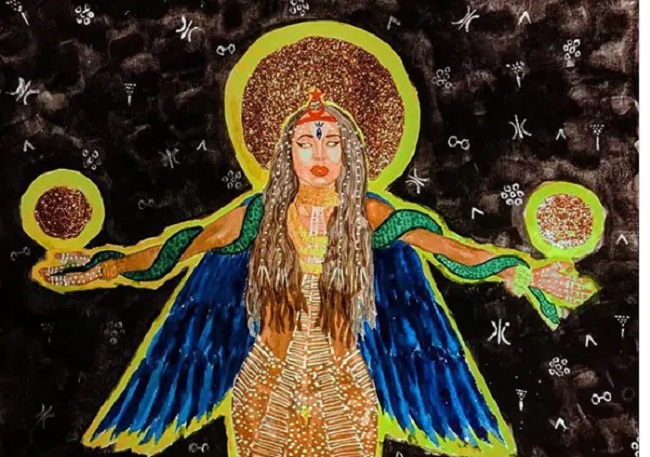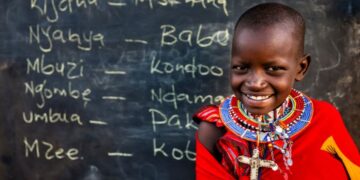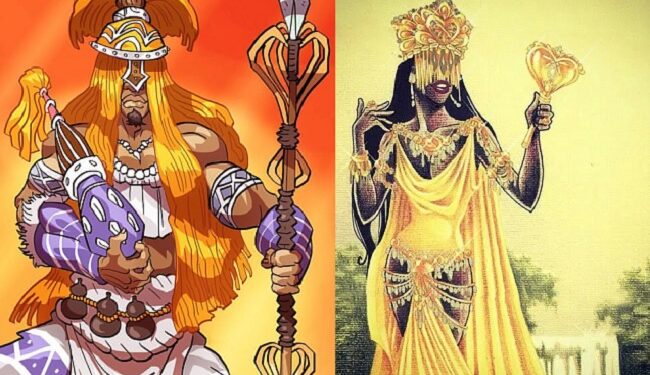Africa has always believed in the existence of supernatural power and being which they regard as their god or goddess. The people used to believe that the Supreme Being created everything on earth until the coming of their colonial masters. The Europeans, who colonized Africa brought Christianity and other religious sects and the African gods and goddesses became almost extinct except for traditional worshippers.
In the African culture, God used to live on earth until he left for heaven after the human transgressions. It was believed that when he left he appointed smaller gods and goddesses to assume some of his roles. In Africa, there are gods of water, rains, fertility, winds, fire among many others. These African gods and goddesses were considered powerful in their different capacities.
This writing is going to focus on just 12 famous African goddesses and gods that ever existed.
A Look At 12 Famous African Goddesses And Gods With Their Unbelievable Capabilities
1. Oshun
The African goddess Oshun is traced to be the god of sweet and freshwaters in Yoruba. She is one of the important deities to the Yoruba people. She is an orisha or spirit that reflects the manifestations of the Yoruba land. She is the goddess of divinity, feminity, fertility, beauty, and love. Oshun has the ability to heal the sick, foster prosperity, and bring fertility. Her image is presented by a beautiful and charming young lady. The word Oshun means sweetness, joy, beauty, and good cheer. She became popular recently when the American singer Beyonce mentioned her in her Lemonade music video.
2. Oya
Oya is better known as Oya-Iyansan which means mother of nine also a goddess worshipped by the Yoruba tribe as well as Benin. She is the wife of Shango, the god of storms and she is the goddess of wind, thunderbolt, and fire. She is said to have powers that can transform gentle breezes to ranging hurricanes. It is even believed that she accompanies Shango during his thunderstorms to destroy buildings and other things. The name Oya means ‘she tore’. She is the patron of the Niger River.
3. Ala

Ala is the god of the earth, morality, fertility, and creativity in Odinani. Ala is considered the most important Alusi in the Igbo pantheon. Ala is the wife of Amadioaha, the god of the sky. In Odinani Ala is the ruler of the underworld and holds the deceased ancestors in her womb. She is the highest Alusi in the Igbo pantheon. The name Ala means ground which denotes her powers over the earth and her status as the ground. The goddess was also involved in judging human actions. She was credited with human fertility as well as the earth’s.
In Nigeria, Ala is still worshipped by the Igbos and is annually celebrated during the yam festival.
4. Yemaya
Yemaya is the goddess of the living the ocean and for that, she is assumed to be the mother of all. This goddess is motherly and protects kids. People believe she can cure infertility in women. The cowrie shells signify her wealth. This deity is worshipped by the people of Nigeria, Benin, and Togo.
5. Obatala
This deity is said to be the husband of Yemaya. Obatala is believed to be the creator of the human body and is the father of all Orishas. Obatala is the representative of Oludumare on earth. He was given the power to create the earth but due to his drunkenness, Oduduwa, his younger sibling did it first. Obatala was given dominion over the mortals he created. He later transformed himself into the great white god who promotes purity, clean living, and clarity of thought.
6. Nana Buluku
Nana Buluku is also known as Nana Buruku the female supreme being in the west African traditional religion of the Fon and Ewe people of Benin and Togo respectively. This deity is said to be the most influential deity that gave birth to the moon spirit Mawu, the sun spirit Lisa and all the universe. Nana Buluku is regarded as the primary creator and is worshipped as the mother goddess. She is usually portrayed with an image of an older woman.
7. Shango
Shango is the god of thunder, lightning, and war. He was the fourth king and warrior of the Yoruba land. He is regarded as one of the most powerful rulers that the Yoruba people have ever had. In Yoruba land, Shango is worshipped on the fifth day of the week he had three wives Queen Oya, Queen Oba, and Queen Oshun. He was considered a powerful and violent leader.
8. Odudua
In the Yoruba tradition, Odudua is the goddess of love, fertility, and the community. He was known to love, unite, and ascribed with the ability to create. Her symbol is black so people wear black when they seek help from the goddess. Black is her sacred color.
9. Babalu Aye
This god was known for doing his best against infections and epidemics. This hardworking god of healing is from the Yoruba tribe. He is the Orisha of healing in all kinds of diseases.
10. Abena
The goddess Abena is also known as the river goddess who shielded children and takes of them as adults. She believes her believers are her children. She is often likened to gold, brass, and other wealth symbols.
11. Ogo
This god is a god of chaos and other horrible things. He wanted to create his own world so he ran away from Amma who was holding him captive. He wanted to save his sister from Amma but unfortunately, escape with the wrong egg. Ogo decided to mate with the egg but the yolk turned hardboiled in a dry dusty yellow earth. His incestuous actions were threatening the entire creation. This god is found in Togo.
12. Inkosazana or Nkosazane
Nkosazana is a mermaid goddess also known as Nomkhubulwana. She is regarded as the source of fertility and water in Zulu. She is linked with the sky among the Zulu people and she has functions relating to fertility and to the calling of diviners. It is believed that she resides in heaven but regularly comes to earth to bring rain and fertility. She is so loved and ever young because she never had children. The Lady Heaven, as she is popularly known, is responsible for cereal grains which is an important element in the Zulu diet. She can manifest as a rainbow, snake, mermaid, a beautiful white woman but she is not commonly seen. Nkosazana brings protects women and young girls who farm.





















Discussion about this post